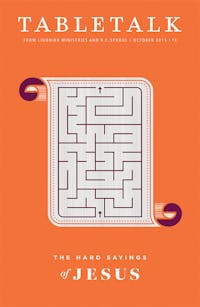
Request your free, three-month trial to Tabletalk magazine. You’ll receive the print issue monthly and gain immediate digital access to decades of archives. This trial is risk-free. No credit card required.
Try Tabletalk NowAlready receive Tabletalk magazine every month?
Verify your email address to gain unlimited access.
Is our doctrine of Christ big enough to accommodate a Jesus who is both truly God and truly man? Maybe that seems like an odd question in this context, but it gets to the heart of why many people have found Jesus’ statement in Matthew 24:36—“concerning that day and hour [of His return] no one knows, not even the angels of heaven, nor the Son, but the Father only”—to be a hard saying.
Some have held a Christology that says Christ is truly God but not truly man. For them, this verse has been hard because it seems to cast doubt on Christ’s deity. If Christ does not know something that the Father knows, Christ lacks omniscience, right? And if Christ is not all-knowing, He cannot be God incarnate, correct?
Others have held a Christology that says Christ is truly man but not truly God. For them, this verse in itself has not been a problem. The difficulty is in their misuse of the verse to deny the New Testament teaching that Jesus is the Son of God in the flesh.
If our Christology can accommodate both the true humanity and true deity of Jesus, this saying is not hard at all. Matthew’s presentation of the true humanity of Jesus is clear from this verse and other passages ascribing human limitations to our Lord (for example, Jesus is asleep in 8:24). Matthew also presents the true deity of Christ. In Matthew’s gospel, Jesus does what only God can do, such as forgiving sins (9:1–8).
Matthew had no problem affirming both the full deity and full humanity of Christ, so neither should we. The one person of Christ has both a human nature and a divine nature, each retaining its integrity and particular attributes. The one person of Christ has human attributes and divine attributes, and we see the attributes of each nature manifested throughout His ministry. His ignorance of the timing of His return pertains to His humanity. According to His human nature, which includes a human mind with its limitations, He did not know the timing of His return. But according to His divine nature, which includes the divine mind with its omniscience, He knew and has always known the day and hour of His return.
